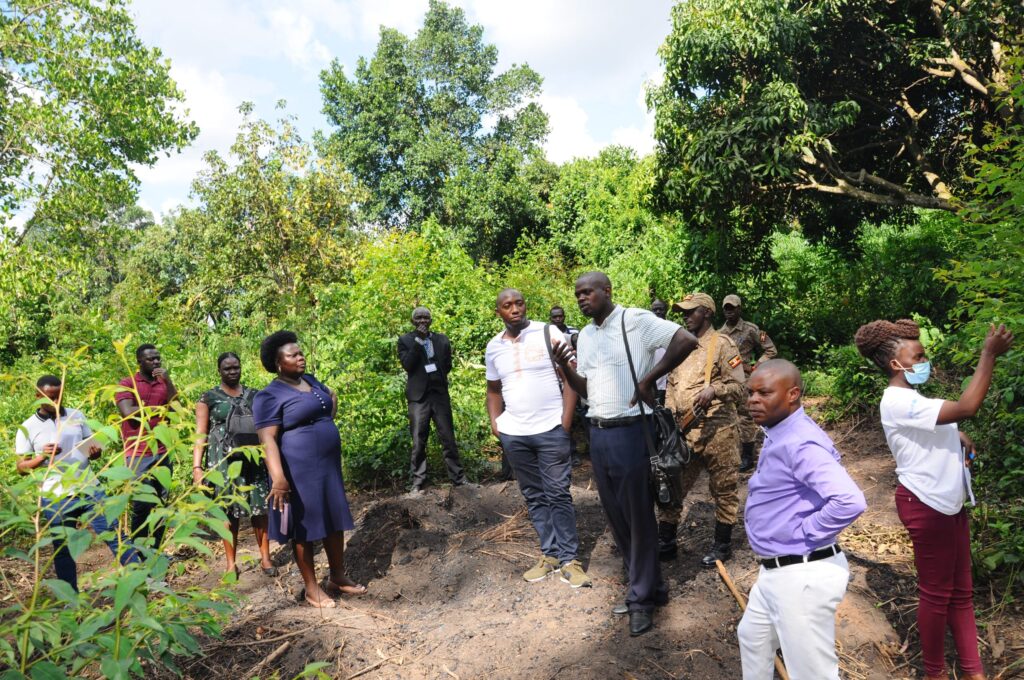Dressed in designer leaves and grass, Joram Asiimwe (not real name) screams-huu, barks and grunts as a playful greeting to children gathered to witness the final match of the Ekiteera (Chimpanzee) Cup.
The tournament aims to empower youth as conservation agents, particularly for chimpanzees, and features competition among clans that regard the chimpanzee as their totem.
Excited pupils from Kiziranfumbi Primary School in Kikuube district, western Uganda, respond with chuffs, mimicking the sounds of chimpanzees as part of a campaign to raise awareness about co-existing with these primates.
The Ekiteera football tournament is organised by The Cross-Cultural Foundation of Uganda (CCFU), a local organisation that promotes cultural rights and diversity management.
This initiative is part of a two-year project, funded by the Arcus Foundation, focusing on the Bunyoro and Rwenzori sub-regions.
CCFU collaborates with media, cultural leaders and private forest owners, fostering intergenerational dialogues between youth and elders to enhance understanding of chimp conservation.
The project also includes tree planting in degraded forests and support for local livelihoods in chimpanzee corridors.
Recognising the importance of engaging youth, CCFU has hosted the Ekiteera Cup annually for the past four years to raise awareness about chimp conservation through sports.
Globally, there are approximately 300,000 chimpanzees, with Africa’s population declining from 200,000 a century ago to around 150,000 today.
In Uganda, the estimated 5,000 chimpanzees are facing a shrinking habitat, particularly in the Bunyoro sub-region, where forested land is increasingly converted for agriculture, lumbering, oil and gas production and settlements due to population growth.
Bunyoro loses about 2.5% of its forest cover annually, surpassing the national average of 1.5%. This has led to significant habitat degradation and increased human-chimpanzee conflicts.
Recent incidents highlight the challenges faced by local communities in living with these apes. Among the cases, a chimpanzee took refuge in the outhouse of a single mother in Rusembe-Duhaga cell, Hoima City West Division causing fear and distress.
In other instances, locals have hunted chimps after injuring children-adults plus destroying their crops.
During a media training and field tour from 22nd to 23rd October, organised by CCFU at Hill View Hotel in Kagadi, CCFU Executive Director, Barbra Babweteera Mutambi, urged journalists to play a vital role in raising public awareness of the cultural and historical significance of chimpanzees beyond their appeal for tourism.
“Our eureka moment came after persistent human-ape conflicts, prompting us to explore conservation strategies,” she said. “We realise that the media on top of advocacy can enhance research and documentation of values linked to chimp conservation.”
CCFU Programme Coordinator Aliguma Ahabyona Asiimwe Akiiki emphasised the need for balanced reporting.
“It is essential to highlight both the positive and negative aspects of chimpanzee conservation to foster co-existence and hope,” he said.
Chimpanzees share 98.7% of their DNA with humans and contribute significantly to tourism revenue.
However, journalists from the Bunyoro and Rwenzori regions noted that the conservation clock is ticking, urging that habitat conservation is critical.
“Without addressing land pressures and improving local conditions, we cannot save the species,” they added.
Masereka Isiah, known as Mbongoman from Nyege FM in Kasese district, added that increasing positive publicity about conservation efforts could shift public attitudes toward wildlife in general.
The workshop was meant to have the media share experiences and best practices from CCFU initiated conservation campaigns in addressing human-chimpanzee co-existence challenges.
Participants were drawn from different media houses based in Bunyoro and Rwenzori and they included New Vision, Bukedde TV, KKCR FM, TV West, The Albertine Journal, Spice FM, Hoima FM, Kabalega FM and Liberty FM and Kazi-Njema News, among others.
CCFU said the next stage of the project with the media involves providing story grants to journalists to pursue impactful stories that raise awareness about chimpanzee-human co-existence.


